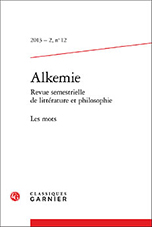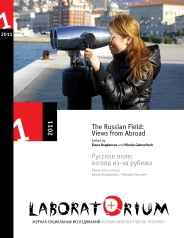
We kindly inform you that, as long as the subject affiliation of our 300.000+ articles is in progress, you might get unsufficient or no results on your third level or second level search. In this case, please broaden your search criteria.


Colette is known for writing about love, but it is not her only concern. She questions herself about the passing of time, ageing, and death. She is unable to resign herself to this fate, experienced as a source of anguish. Our analysis studies the literary figures which testify to this, with reference to the work of Gilbert Durand, notably Les Structures anthropologiques de l’imaginaire.
More...
Words are tools which depend on social, spatio-temporal, and linguistic environments, have a history, and produce psychological, political, and paradigmatic effects. The stakes implicit in their conservation and classification are high and, despite modernday technology and the primacy of the image, they remain, as Descartes would have it, the mark of humanity.
More...
The educational benefits of foreign words are not immediately obvious. However, as Hegel shows, the study of a foreign language allows us to increase our understanding of concepts and deepen our knowledge of things by encouraging us to reflect on our own language. The difference between languages should not be seen as an insurmountable obstacle. Humboldt’s comparative linguistics provides us with the tools to conceive of a pedagogy of languages.
More...


According to Foucault, words in the Renaissance were transparent. There was no obstacle between signifier and signified. Words and things were the same and the writer, through his or her sensibility, had access to the correspondence between prose and world. However, classical epistemology, and then linguistics, created a representative language which brought about the loss of the natural link between word and world. Is it possible that writing can rediscover the world ?
More...



Robert Pfaller has argued that glamour has declined in the public space of Western societies in response to calls for more authenticity voiced in the cultural revolution of 1968. Among the urban middle class in post-Soviet Russia, in contrast, glamour continues to serve as an ideological representation of power. Helped by glamour ideology, status rituals banned from official discourse throughout the Soviet era have gone from “collective repressed” to cultural imperative. Based on interviews with three generations of women in Yekaterinburg and in and near Moscow, the article analyzes glamour as a micro-mechanism of power (Foucault). For women socialized under Stalin, elegance under conditions of scarcity was a matter of inventiveness. For the Khrushchev generation, glamour is related to normative notions of taste, status, and femininity. For young urban professionals today, dress is a tool for achieving professional and private goals.
More...
Robert Pfaller has argued that glamour has declined in the public space of Western societies in response to calls for more authenticity voiced in the cultural revolution of 1968. Among the urban middle class in post-Soviet Russia, in contrast, glamour continues to serve as an ideological representation of power. Helped by glamour ideology, status rituals banned from official discourse throughout the Soviet era have gone from “collective repressed” to cultural imperative. Based on interviews with three generations of women in Yekaterinburg and in and near Moscow, the article analyzes glamour as a micro-mechanism of power (Foucault). For women socialized under Stalin, elegance under conditions of scarcity was a matter of inventiveness. For the Khrushchev generation, glamour is related to normative notions of taste, status, and femininity. For young urban professionals today, dress is a tool for achieving professional and private goals.
More...
This tribute to Harold Garfinkel (1917–2011) attempts to situate the U.S. sociologist’s work, and in particular the ethnomethodological approach he developed, in the present state of the social sciences. Ethomethodology is neither a sociological theory nor a tradition in the customary sense of the term. This makes it more difficult to appreciate Garfinkel’s legacy as a unified project. In order to overcome this difficulty, the paper uses the metaphor of a catalog or, more precisely, a series of differently organized catalogs. First and most important among these is an inventory of Gafinkel’s research, beginning with his doctoral dissertation. The second is a catalog of ethnomethodological studies carried out by his colleagues and students. The third includes the sources, authors, and books that Garfinkel continuously returned to in his intellectual endeavor. Far from being exhaustive or final, this list aims, rather, to convey the spirit of ethnomethodology, whose effectiveness was proven in every one of Garfinkel’s studies. This brief memoir recounts one day the author spent with Harold Garfinkel (1917–2011) and his wife at their house in Los Angeles—the day Garfinkel was invited to join the advisory board of Laboratorium. Intending to interview the sociologist, the author found herself instead having to respond to his questions and received career-building recommendations. The article stresses Garfinkel’s profound passion for his profession as well as the consideration, tact, and respect he showed his students.
More...

The paper discusses methodological and ethical challenges of oral history projects that address experiences of systematic violence. I offer a discussion of the relationship between individual remembering and social discourses about the past, interrogating how this relationship affects the representation of gendered experiences in the Soviet partisan movement during World War II. Utilizing theoretical and methodological approaches to oral history, especially of feminist scholarship, I explore how repercussions of Soviet discourses, namely of restrictions to public and private communication, play out in the construction of portrayals of the past in qualitative interviews.
More...


Introduction to a thematic issue on ethnographic approaches to contemporary Russia by foreign researchers from a variety of fields. The issue is based on a conference held in Saint Petersburg in 2009, itself modeled after a similar conference in Germany ten years earlier. Integrating the foreign gaze into one’s own self-image is a straightforwardly useful exercise for social scientists from Germany and Western countries that have a history of colonial or hegemonic control over countries from the Global South. In Russia, whose self-image was shaped by foreign observers from the beginnings of academic study, the experiment is more complicated. Nevertheless, foreign ethnographers can contribute useful insights qua foreigners. However, Russia’s alterity, obvious to an older generation of Westerners visiting the Soviet Union, is no longer a matter of course for their younger colleagues with more transnational biographies.
More...
The article discusses the constitution of a new therapeutic emotional cultural style in post-Soviet Russia. Its manifestations are particularly evident in the media, where off-the-shelf forms of Western late capitalist popular culture are imitated, seemingly in a one-to-one fashion. Engaging with the literature on emotional capitalism, the author points to the particular conditions in which therapeutic culture is being adapted in Russia. The alternative tradition of subjectivity in the Russian/Soviet cultural universe lacks a therapeutic Self, and the post-Soviet discursive condition is characterized by a gap in authoritative discourses of articulation of individual and private life. It is argued that as a result of these conditions the therapeutic culture is developing in post-Soviet Russia prior to or without psychology, and above all, it is not a product or function of psychological knowledge. The article’s empirical focus is on examples of translation of therapeutic forms in the field of TV media.
More...
The paper discusses methodological and ethical challenges of oral history projects that address experiences of systematic violence. I offer a discussion of the relationship between individual remembering and social discourses about the past, interrogating how this relationship affects the representation of gendered experiences in the Soviet partisan movement during World War II. Utilizing theoretical and methodological approaches to oral history, especially of feminist scholarship, I explore how repercussions of Soviet discourses, namely of restrictions to public and private communication, play out in the construction of portrayals of the past in qualitative interviews.
More...